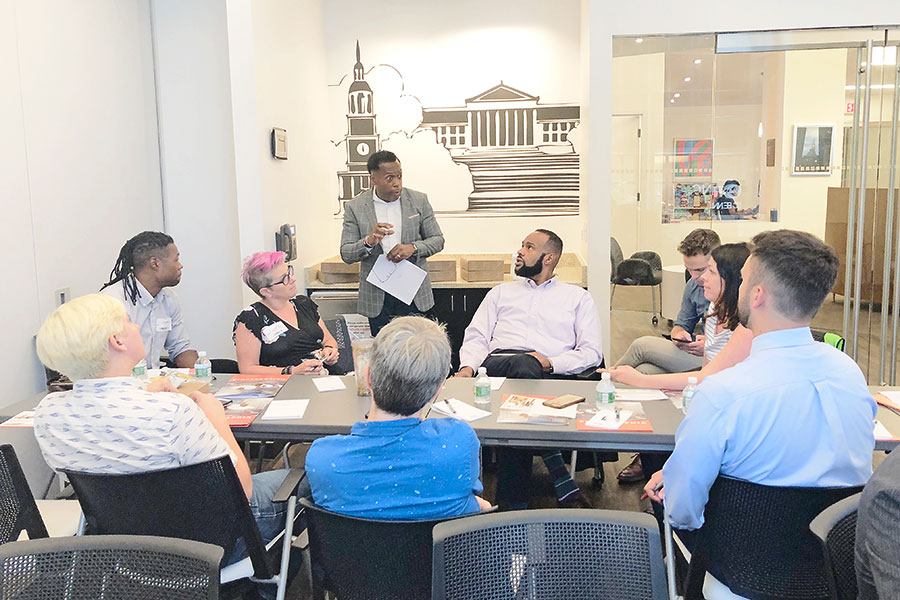A Philadelphia subcommittee dedicated to ensuring accurate LGBTQ representation on the 2020 Census met this week to discuss navigating the barriers to an inclusive count.
The July 22 meeting, organized by PHL Diversity at the Philadelphia Convention and Visitor’s Bureau, was the group’s second gathering. About 12 LGBTQ community leaders gathered to set a community-engagement plan leading up to the census, though about 25 people serve on the subcommittee, said Greg DeShields, PHL Diversity executive director and LGBTQ subcommittee chair. The team’s focus is to increase LGBTQ responses on the census and educate people about the survey’s questions and how participation can impact the queer community.
Conducted once every 10 years, the census is used to determine Congress representation; distribute more than $675 billion in federal funding to states and communities; and allocate resources for job creation, housing, infrastructure and other sectors, according to subcommittee materials.
Accurate LGBTQ representation on the census directs politicians to represent the community and secure funding for LGBTQ resources and organizations, Deshields said.
“It’s about ensuring that our voice is included,” he added. “It’s important for us to not lose the importance of our contribution and become too passive in how we engage in the things that really are a part of our civic duty.”
The “sex” question on the census, asked since 1790, offers only two options: male or female. This can pose a challenge for trans, nonbinary and gender nonconforming folks, DeShields said during the meeting.
While a municipal or state ID allows people to denote their authentic gender, the committee reminds respondees — because the Census is run by the federal government — they must answer based on the gender denoted on their federal documentation.
“Responses to the federal U.S. Census are required to be truthfully and accurately aligned with their federal documents,” Deshields told PGN. “There are legal guidelines and penalties for those participating during the U.S. Census.”
The 2020 census will also change how couples living together can define their relationship. Options are:
• Opposite-sex husband/wife/spouse
• Opposite-sex unmarried partner
• Same-sex husband/wife/spouse
• Same-sex unmarried partner
Previously, the bureau counted same-sex couples based on responses to sex and relationship questions.
Through December, the LGBTQ subcommittee will hold job fairs promoting paid, temporary work opportunities with the census. This will include a Sept. 17 “champion training” day devoted to teaching at least 1,000 people how to educate Philadelphians about the Census and the importance of participating.
The LGBTQ-plus 2020 Census Philly Complete Count Sub-Committee is one of 19 groups encouraging participation of a different subset of Philadelphia’s population. All the subcommittees are:
• Aging
• African American
• African and Caribbean
• Asian American
• Census Jobs
• Civic engagement
• Corporations and philanthropy
• Elected officials
• Children 7 youth
• Higher education
• Homeless and public housing
• Immigrant and LEP
• Interfaith
• Labor
• Latinx
• LGBTQ+
• Municipal
• Neighborhood business
• Nonprofits and CEOs
Tami Sortman, PHL Diversity board member and LGBTQ subcommittee participant, helped organize a similar campaign to encourage LGBTQ participation in the 2010 census. Rainbow signs were placed in some of the city’s businesses in attempts to increase queer response rates, she said.
“If we’re not counted, they aren’t going to give us the funds that we need for our community,” Sortman added. “That’s why we’re making such a big deal out of this, because we have to know. We have to be counted.”
On Aug. 1, all 19 subcommittees will hold a joint engagement planning meeting. The next LGBTQ subcommittee gathering will take place Aug. 28.
Census day is April 1, 2020.
